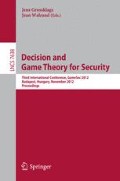Abstract
Most cryptographic systems carry the basic assumption that entities are able to preserve the secrecy of their keys. With attacks today showing ever increasing sophistication, however, this tenet is eroding. “Advanced Persistent Threats” (APTs), for instance, leverage zero-day exploits and extensive system knowledge to achieve full compromise of cryptographic keys and other secrets. Such compromise is often silent, with defenders failing to detect the loss of private keys critical to protection of their systems. The growing virulence of today’s threats clearly calls for new models of defenders’ goals and abilities.
In this paper, we explore applications of FlipIt, a novel game-theoretic model of system defense introduced in [14]. In FlipIt, an attacker periodically gains complete control of a system, with the unique feature that system compromises are stealthy, i.e., not immediately detected by the system owner, called the defender. We distill out several lessons from our study of FlipIt and demonstrate their application to several real-world problems, including password reset policies, key rotation, VM refresh and cloud auditing.
Access this chapter
Tax calculation will be finalised at checkout
Purchases are for personal use only
Preview
Unable to display preview. Download preview PDF.
References
Ateniese, G., Burns, R., Curtmola, R., Herring, J., Kissner, L., Peterson, Z., Song, D.: Provable data possession at untrusted stores. In: Proc. 14th ACM Conference on Computer and Communication Security, CCS (2007)
Barker, E., Barker, W., Polk, W., Smid, M.: Recommendation for key management II: Best practices for key management organization. NIST SP (2/3), 1–79 (2005)
Juels, A., Kaliski, B.: PORs: Proofs of retrievability for large files. In: Proc. 14th ACM Conference on Computer and Communication Security (CCS), pp. 584–597 (2007)
Katz, J.: Bridging Game Theory and Cryptography: Recent Results and Future Directions. In: Canetti, R. (ed.) TCC 2008. LNCS, vol. 4948, pp. 251–272. Springer, Heidelberg (2008)
Mailath, G.J., Samuelson, L.: Repeated Games and Reputations: Long-run relationships, Oxford (2006)
Manshaei, M., Zhu, Q., Alpcan, T., Basar, T., Hubaux, J.P.: Game Theory Meets Network Security and Privacy. Technical report, EPFL (2010)
Moore, T., Friedman, A., Procaccia, A.: Would a “cyber warrior” protect us? Exploring trade-offs between attack and defense of information systems. In: NSPW, pp. 85–94 (2010)
Myerson, R.B.: Game Theory—Analysis of Conflict. Harvard University Press (1997)
Nguyen, K.C., Alpcan, T., Basar, T.: Security games with incomplete information. In: Proc. IEEE International Conference on Communications, ICC (2009)
Pavlovic, D.: Gaming security by obscurity, CoRR abs/1109.5542 (2011)
Radzik, T.: Results and problems in games of timing. Statistics, Probability and Game Theory 30 (1996)
Rivest, R.L.: Illegitimi non carborundum. Invited keynote talk given at CRYPTO 2011 (August 15, 2011), http://people.csail.mit.edu/rivest/pubs.html#Riv11b
Roy, S., Ellis, C., Shiva, S., Dasgupta, D., Shandilya, V., Wu, Q.: A survey of game theory as applied to network security. In: Int. Conf. on System Sciences (HICSS), pp. 1–10 (2010)
van Dijk, M., Juels, A., Oprea, A., Rivest, R.L.: FlipIt: The game of “stealthy takeover”. To appear in Journal of Cryptology (2012)
Witty, R.J., Brittain, K., Allen, A.: Justify identity management investment with metrics. Gartner Group report (February 23, 2004)
Author information
Authors and Affiliations
Editor information
Editors and Affiliations
Rights and permissions
Copyright information
© 2012 Springer-Verlag Berlin Heidelberg
About this paper
Cite this paper
Bowers, K.D. et al. (2012). Defending against the Unknown Enemy: Applying FlipIt to System Security. In: Grossklags, J., Walrand, J. (eds) Decision and Game Theory for Security. GameSec 2012. Lecture Notes in Computer Science, vol 7638. Springer, Berlin, Heidelberg. https://doi.org/10.1007/978-3-642-34266-0_15
Download citation
DOI: https://doi.org/10.1007/978-3-642-34266-0_15
Publisher Name: Springer, Berlin, Heidelberg
Print ISBN: 978-3-642-34265-3
Online ISBN: 978-3-642-34266-0
eBook Packages: Computer ScienceComputer Science (R0)

